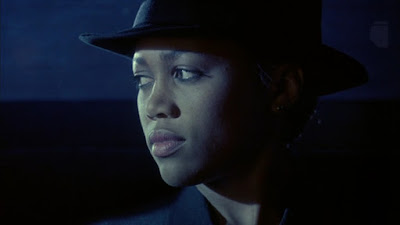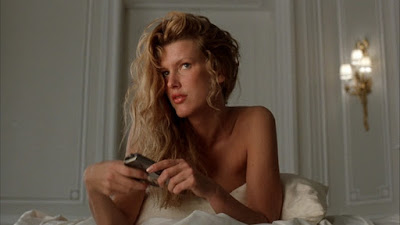Since my opinion regarding the quality of Abel Ferrara's King of New York might get lost in a half baked haze of nonsensical wordplay revolving around leggy floozies. I think I should state right up front that this movie rules. Sure, the extended gun battle/car chase sequence goes on a little too long, but the film is sexy, stylish and wonderfully violent. Okay, now that we got that out of the way, let's talk leggy floozies, shall we? After showing Christopher Walken's charismatic crime boss, Frank White, being released from prison, we're whisked inside some kind of bordello. The film has barely got underway, and I'm already up to my ears in leggy floozies. And not only that, one of the leggy floozies is wearing white stockings. At first I thought the leggy floozy in white stockings was played by Phoebe Legere (The Toxic Avenger Part II)–you know, since I've yet to see her in a movie where she doesn't wear white stockings. However, it's obvious that Phoebe Legere, who is credited as "Bordello Woman," is the floozy sitting at the piano. Well, whoever plays the leggy floozy in the white stockings in the bordello scene near the beginning of King of New York, I thought she did a bang up job at... being a leggy floozy. I mean, I really got the sense that she was leggy (the white stockings helped) and that she was a floozy (she's slobbering all over some pimp like he was a chew toy).
It should be noted that when the pimp goes outside to make a phone call at a nearby phone booth, he's gunned down by a gang of thugs. It would seem that the gunmen work for Frank White, who is already making his presence felt (he's only been out of prison for a few hours).
While I'll miss the leggy floozies who worked for the pimp who was filled full of lead, we're quickly introduced to Raye (Theresa Randle) and Melanie (Carrie Nygren), Frank's go-to leggy floozies. Or are they? Don't get me wrong, they're definitely leggy, especially Raye. But I wouldn't call Raye and Melanie floozies. And I wouldn't even call them gangster's molls. No, the services Raye and Melanie provide Frank go way beyond anything I've seen women do in a movie of this type.
Usually relegated to lounging sexily in the background, women are rarely given much to do in movies about gangsters. Well, I think it's safe to say that Frank White isn't your typical gangster. And this irregular approach also applies to the women in his life.
Integral to the day-to-day operation of his criminal empire, which he runs out of a suite in the Plaza Hotel, Faye and Melanie act as his Frank's bodyguards and do his bookkeeping on a pair of 1989-era computers. If you're wondering which of them Frank is fucking, don't be crude. If you must know, he ain't fucking either of them. No, Frank is actually dating Jennifer (Janet Julian), who also happens to be his lawyer. So, you see, women play a big role in Frank's life. Which, I must say, is something I found quite refreshing.
Some might argue that the pronounced role that women play gives the film an unrealistic air. I say, poppycock to that. If you want to see a bunch of guys doing gangster shit in and around New York City, watch one of them Martin Scorsese flicks, or better yet, try the Godfather films. If you want to watch a New York City gangster movie that has a slightly oft-kilter vibe to it, watch an Abel Ferrara film. Hell, even the two episodes of Miami Vice he directed ("The Dutch Oven" and "The Home Invaders") have a slightly oft-kilter vibe about them.
However, and this should come as no surprise, the bulk of this particular film's oft-killer vibe can be attributed to Christopher Walken, whose performance is... well, it's... you know. Let's just say, it's more Walken-esque than usual. In other words, he glares, he dances (to Schooly-D), he shoots people... repeatedly. It's classic Walken.
The fact that his character is so beloved by the likes of Laurence Fishburne (Jimmy Jump, yo), Giancarlo Esposito and Leonard L. Thomas, who play Frank White's fiercely loyal lieutenants, does nothing but add to the film's already surreal temperament. Oh, and it doesn't hurt that Steve Buscemi plays Test Tube, Frank White's "chemist." I love the scene where Fishburne (whose performance is beyond manic - he can't even order chicken without incident) and Buscemi team up to take down a gang of rival drug dealers. Sadly, Buscemi's character goes AWOL just as Frank is about to consolidate his power.
Oh, did I mention that the leggy floozy in the white stockings from the bordello scene was wearing a peaked cap? I didn't? That's weird. Well, I'm mentioning it now.
Which is also a good time to mention the woman sitting behind Frank and Jennifer at a play. You see, she's wearing a peaked cap as well. Was this a trend or something back then? Either way, I'm digging it.
With the exception of the cops, played by Victor Argo, Wesley Snipes, David Caruso and Frankenhooker's James Lorrinz (I love this guy), everyone in this film is impeccably dressed.
Speaking of Frankenhooker, Lia Chang, who plays one of the hookers (her butt, if memory serves me correctly, becomes a part of "Frankenhooker") is the gangster's moll to a drug dealer named Larry Wong (Joey Chin). Seen at a screening of Nosferatu and again during a shoot-out in a Chinatown alleyway, Lia Chang always has this knowing smirk on his face that churns my butter in the right direction, if you know what I mean.
I almost forgot. Like Raye and Melanie, Lia Chang is no mere leggy floozy. She gets in a back-alley SMG battle with Christopher Walken while wearing a super-tight black mini-dress. And trust me, it's as awesome as it sounds.
Filmed at a time when New York City was still the coolest place on Earth (the spring of 1989), King of New York, despite the cliched subject matter (I'm not a fan of mob/gangster movies - I find their antics to be distasteful, overly macho and boring as fuck), manages to stand out from goombah/gangsta crowd. Anchored by Christopher Walken, and, to a lesser extent, Laurence Fishburne, who both give wonderfully unhinged performances, the film is, like I said earlier, sexy, stylish and violent. Oh, and apparently the word "fuck" is uttered a total of 90 times.




































































































